2021 年北京中考英语试题及答案
姓名_____________准考证号_____________考场号_____________座位号_____________
考
生
须
知
1. 本试卷共 10 页,共两部分,共 39 题,满分 60 分,考试时间 90 分钟。
2. 在试卷和草稿纸上准确填写姓名、准考证号、考场号和座位号。
3. 试题答案一律填涂或书写在答题卡上,在试卷上作答无效。
4. 在答题卡上、选择题用 2B 铅笔作答,其他试题用黑色字签字笔作答。
5. 考试结束,请将本试卷、答题卡和草稿纸一并交回。
第一部分
本部分共 33 题,共 40 分。在每题列出的四个选项中,选出最符合题目要求的一项。
一、单项填空(每题 0.5 分,共 6 分)
从下面各题所给的 A、B、C、D 四个选项中,选择可以填入空白处的最佳选项。
1. Mary’s birthday is coming.
We've decided to make a cake for_________.
A. him
B. her
C. you
D. them
2. Space Day of China falls________ April 24th every year.
A. on
B. by
C. at
D. in
3. —______shall we meet for the picnic?
—At the school gate
A. How
B. When
C. Why
D. Where
4. —Sam,_________I join you in the community service?
—Of course you can.
A. can
B. must
C. should
D. need
5. The doctors worked for ten hours,___________nobody took a break.
A. so
B. for
C. but
D. or
6. The teacher is glad to see that Tony is_______than before
A. careful
B. more careful
C. most careful
D.
the most careful
7. —Peter, what are you doing?
�
—Oh,I_________a report about national heroes.
A. will write
B. am writing
C.
wrote
D.
have
written
8. My parents and I_________ trees last Sunday.
A. plant
B. will plant
C. are planting
D. planted
9. —Lily, what do you usually do after school?
—I_________exercise with my friends.
A. do
B. did
C. will do
D. was doing
10. Mr. Smith______ Chinese for two years.
He's much better at it.
Now.
A. learns
B. was learning
C. has learned
will learn
11. Today, many winter Olympic sports__________ even by children.
A. enjoyed
B. enjoy
C. were enjoyed
D.
D.
are enjoyed
12. —Could you please tell me_________?
—Next Thursday morning.
A. when we visited the Capital Museum
B. when did we visit the Capital Museum
C. when we will visit the Capital Museum
D. when will we visit the Capital Museum
二、完形填空(每题 1 分,共 8 分)
阅读下面的短文,掌握其大意,然后从短文后各题所给的 A、B、C、D 四个选项中,选
择最佳选项。
The Picture of Peace
When Mike was seven, he knew his dream was to be a photographer.
He kept
working on it for years.
Recently, he was trying to take a picture of a
sunset(日落) to enter the school ___13___ competition.
“Mom, it has been cloudy these days.
I don't think I can get this
picture!" Mike complained.
�
“Why not use one of your photos on the computer?" suggested Mom.
“I can't-the rules say the photos have to be taken with
a traditional camera.
We hand in a roll of film, it gets developed(冲洗胶
卷) , and we__14___one photo for the competition. ”
“Why is a sunset so important?" Mom asked.
“The___15___of the competition is peace,” Mike explained, “and I feel
most peaceful seeing a sunset.”
Zach, his six-year-old brother came out of the bedroom. ” Hey, you want
to take a picture of me? Look!" He put both arms over his head.
“Not right now,” said Mike, laughing.
That very afternoon, Mike felt excited when he saw clear skies.
He
carefully lined up his shot(镜头) and waited___16____till the sun reached the
ground.
“That's it! Perfect!” he shouted cheerfully.
The next morning, Mike noticed he could take one more picture to complete
the roll of film, so he walked into Zach's room.
Zach was ___17___quietly
with a teddy bear under his arm. Mike didn't wake Zach up, and carefully took
a picture of him.
A week later, Mike got the photos.
The sunset picture was the one he was
most___18___to see. There it was! It was as nearly perfect as Mike had expected.
Then, he looked through the other photos.
Suddenly, he stopped.
His
eyebrows(眉毛) rose as he __19__the photo of Zach.
He looked back at the photo
�
of the sunset, which seemed less perfect now.
He ___20___the two choices.
Finally, he decided to hand in the photo of Zach for the competition.
13. A. violin
B. tennis
C. photo
D. chess
14. A. choose
B. collect
C. describe
D. design
15. A. prize
B. topic
C. result
D.
purpose
16. A. politely
B. bravely
C. hopefully
secretly
17. A. playing
B. reading
C. writing
sleeping
18. A afraid
B. eager
C. surprised
D.
D.
D.
confused
19. A. studied
B. shared
C. copied
D. fixed
20. A. changed
B. offered
C. accepted
D. weighed
三、阅读理解(每题 2 分,共 26 分)
阅读下列短文,根据短文内容,从短文后各题所给的 A、B、C、D 四个选项中,选择最
佳选项。
A
Young Heroes for the Planet
Nowadays, people around the world are working to help our planet.
Check
out how the four young adults made a difference.
Saving Pandas
When Jack was 11 , he started a group to teach kids about pandas.
He also sold toy pandas to raise money to protect pandas in danger.
“I hope to encourage more people to care about pandas,” Jack says.
Growing Right
Kathy, 14, set up an organization to educate people about growing
right plant in right places.
She also wrote a book to help people
learn what plants are native to (本土的)their area.
�
Creating Energy
At the age of 12 Linda invented a machine called SuperE.
It
collects heat from fields to make electricity(电), Linda says her
invention creates electricity in a way that is less harmful to the
environment.
Cleaning Up
Patrick, 13, joined the Ocean Heroes Camp last year.
He started a
project and picked up plastic waste around nearby lakes with his
friends. The goal of the project was to fight plastic pollution.
21. Who started a group to teach kids about pandas?
A. Jack.
B. Kathy.
C. Linda.
D. Patrick.
22. How old was Linda when she invented SuperE?
A. 11.
B. 12.
C. 13.
D. 14.
23.
What was the goal of Patrick's project?
A. To fight plastic pollution.
B.
To protect pandas in danger
C.
To learn about native plants.
D. To use heat to make electricity.
B
When I was in the eighth grade, my class was assigned(指派) to be friends
with the second-grade kids.
I got this little girl named Shelley.
The first
time I saw her, she was silent and cold.
She was small for her age, and she
didn’t play with the other kids in her class.
I tried all kinds of things to get her to talk to me.
I bought her toys,
crayons and candies, But try as I might, nothing worked.
One tine, I gave
her a coloring book and said, “Shelley, now you can color in it any time.”
Shelley looked at the coloring book and then looked up at me, and finally
looked away.
By that, I didn't know how I was going to get through to the
little girl, but I knew I wouldn’t give up on her.
�
One Friday.
I decided to tell her a story about my childhood.
I told her
that l felt lonely when I was with my classmates, and how I thought only my
teachers liked me. I also told her that every day was a battle(战役) for me and
I fought back tears so people wouldn't know how much I was hurting.
She sat there just listening, trying to decide whether I was lying or not
Finally, when my story ended, there were tears in her eyes.
And then she did
the unthinkable. She said, “Thank you.” From then on, Shelley was a
different little girl.
She started smiling and talking with other kids.
Looking back at this I’m in awe(惊叹), because all I did was to help her
realize that she wasn't alone. I didn't ask her to tell her story, because her
story is my story.
24. What was Shelley like when the writer first saw her?
A. Cold.
B. Lazy.
C. Noisy.
D. Slow.
25. In order to get through to Shelley, the writer_________.
A. wrote her a book
B. made her a toy
C.
drew her a picture
D. told her a story
26. Shelley changed a lot because she realized that___________.
A. her teachers loved her
B. her classmates were kind
C. the writer understood her
D. she had to study even harder
School Gardens Could Help Children Try More Vegetables
C
It's not always enjoyable for children to eat vegetables.
But what if a
garden is built in the school? New research suggests that a gardening program
in schools can increase children's vegetable intake(摄入量) .
How the Study Was Carried Out
�
The study was carried out in eight schools, Each school was in the
gardening program for one school year.
Every child in grades 3-5 received a
total of eighteen 60-minute lessons across the school year.
In the program,
each school built a garden, where children learned to grow their own fresh
produce, like fruit and vegetables.
The Benefits Children Could Get
The study found that vegetable intake if the children who grew their own
produce increased greatly across the year.
Related studies show that increased
vegetable intake can improve health and cut the risk of chronic diseases(慢性疾
病).
Not only are there benefits to health, increasing the variety of
vegetables children are exposed(接触)to may also make mealtimes much easier.”
Children who are often exposed to a variety of vegetables are more likely to
try new foods,” explains Dr.
Kerry Jones.
For children, growing their own
food is a powerful tool to increase their intake of the food.
___28___
Any opportunity to expose children to more vegetables is meaningful. “If
children are learning about vegetables at school, it’s important to encourage
this interest,” says Jones.
Parents can listen to their children about what
they have learned and read the handouts they bring home from school. Parents
and children can also read books together.
Younger children can enjoy reading
stories about vegetables with parents who offer useful message.
Older children
may enjoy searching through cookbooks with parents to find new dinner ideas to
cook vegetables in a tasty way.
Besides, a small planter box in a sunny part
at home can encourage children to understand more about where their food comes
from.
Teaching children to grow their own produce is a great way to increase
their preference for the produce.
If children are taught to enjoy vegetables
early in life, they will probably continue eating vegetables in the long term.
�
27. What did children do in the gardening program?
A.
They did research on new plants.
B.
They grew fresh produce at school.
C.
They took home green vegetables
D.
They built gardens for their classes.
28.
Which of the following would be the best heading for Paragaph4?
A.
Ideas to Encourage Children to Cook at Home
B.
Ways to Expose Children to Vegetables at Home
C.
Reasons Why Parents Should Understand Children
D.
Suggestions Which Children Could Get from Parents
29.
What can we learn from the program?
A.
Parent’ support might improve children’s reading.
B.
School programs could develop students’ creativity.
C.
Doing studies can prepare students for future learning.
D.
Hands-on experience may influence children’s preference.
D
Nature and culture are often seen as opposite ideas.
What belongs to
nature cannot be the result of human activities and. on the other hand,
cultural development is achieved against nature. However.
this is not the
only opinion on the relationship between nature and culture. Studies in the
development of humans suggest that culture, whether taken as an effort against
nature or a natural effort, is part of the development of the human species(物
种).
Several modern writers saw the process of education as a struggle(斗争)
against human nature.
We are born with wild natures.
such as eating and
behaving in a disorganized way or acting selfishly.
Education uses culture as
a way to get us out of our widest natures; it is thanks to culture that the
human species could learn to adapt(适应) , progress and raise itself above and
beyond other species.
�
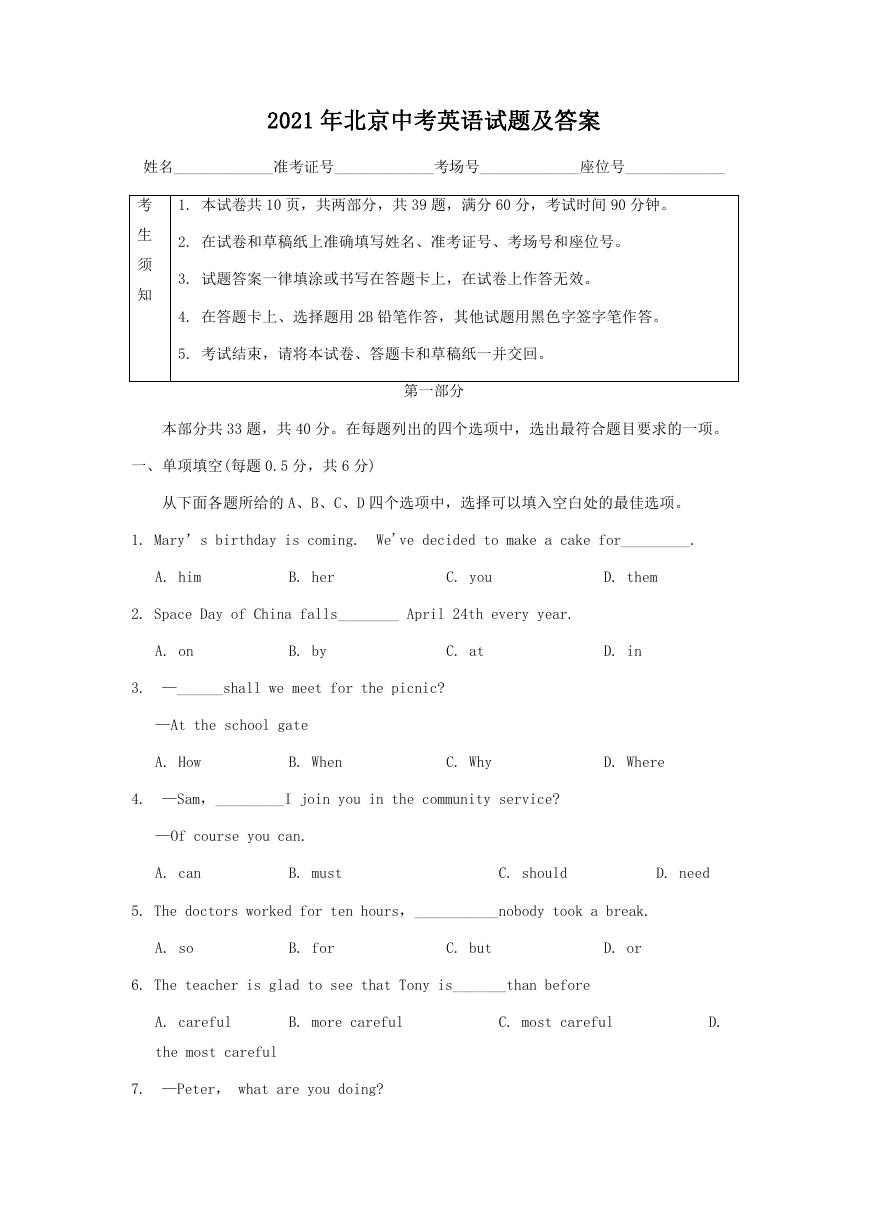
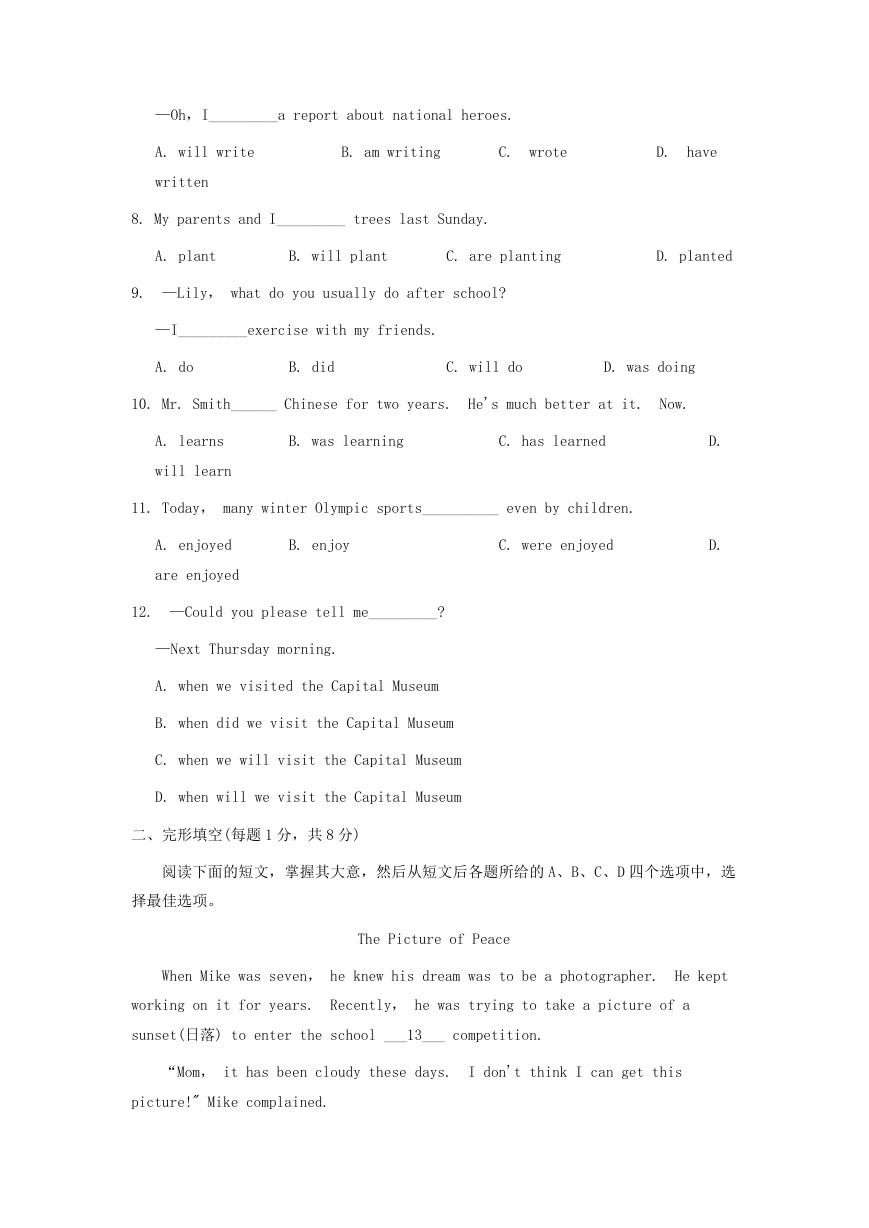
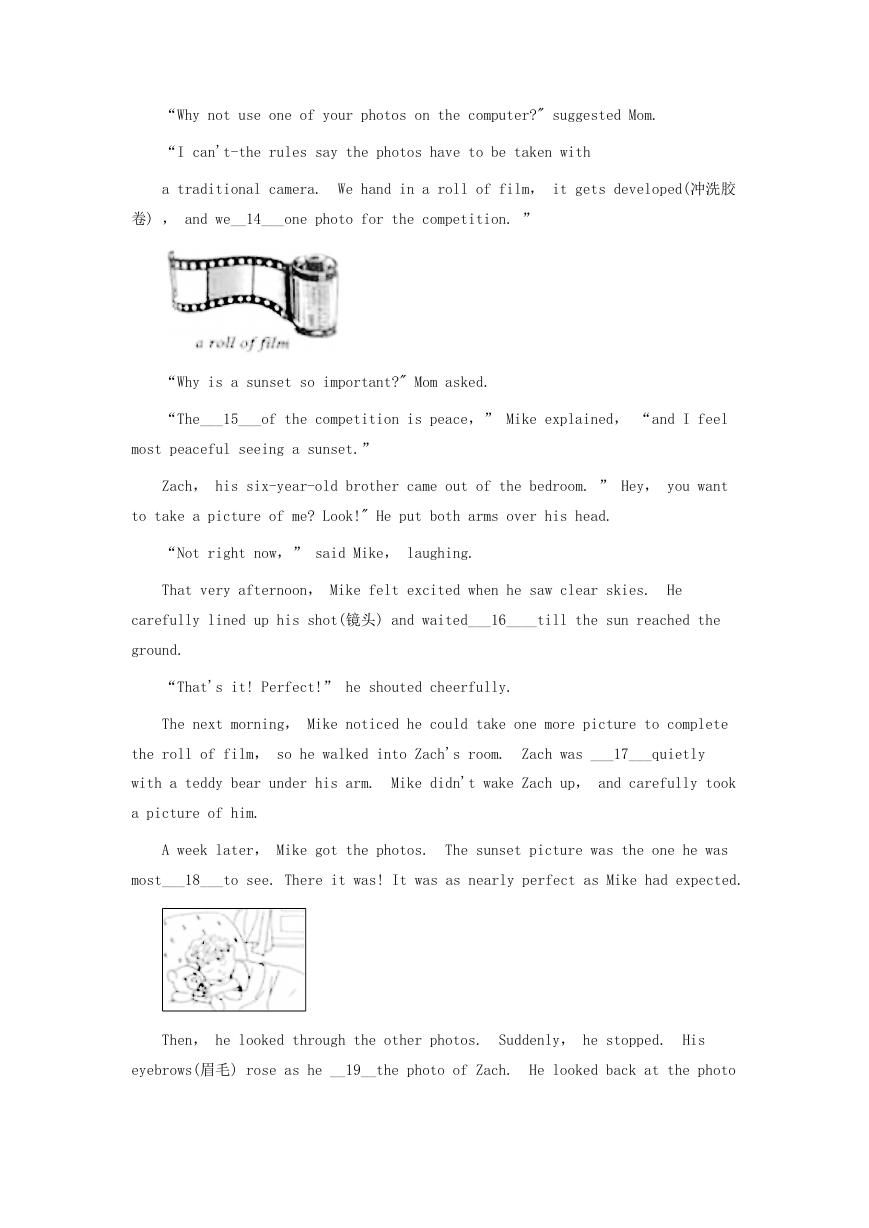
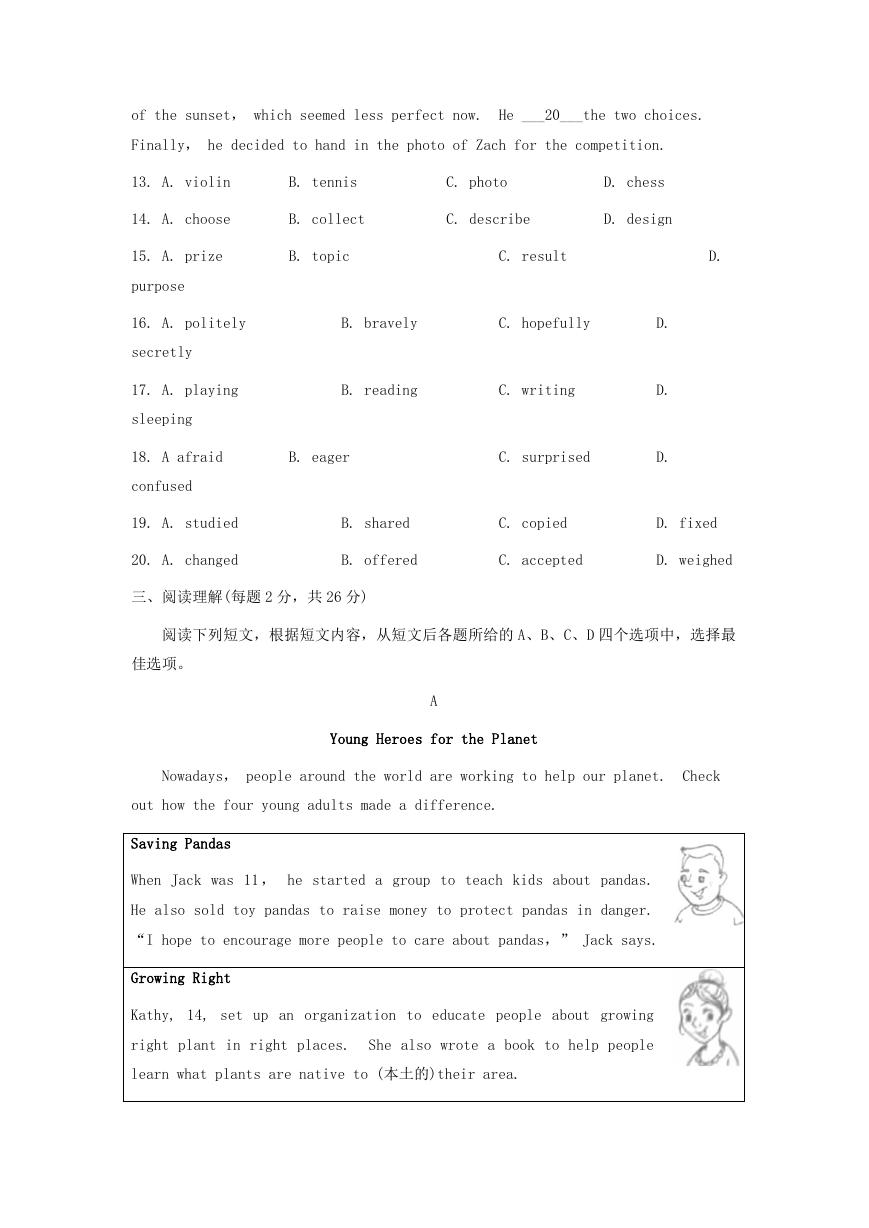
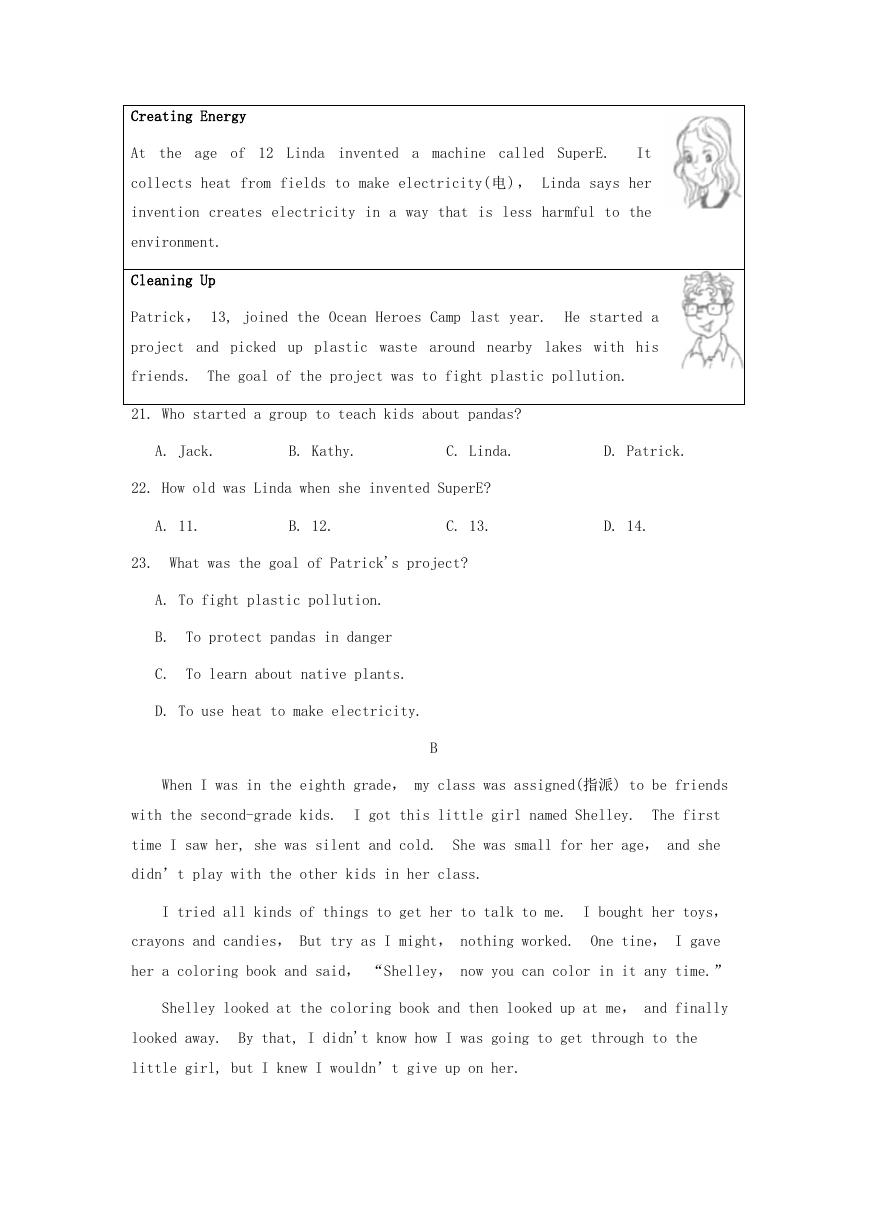

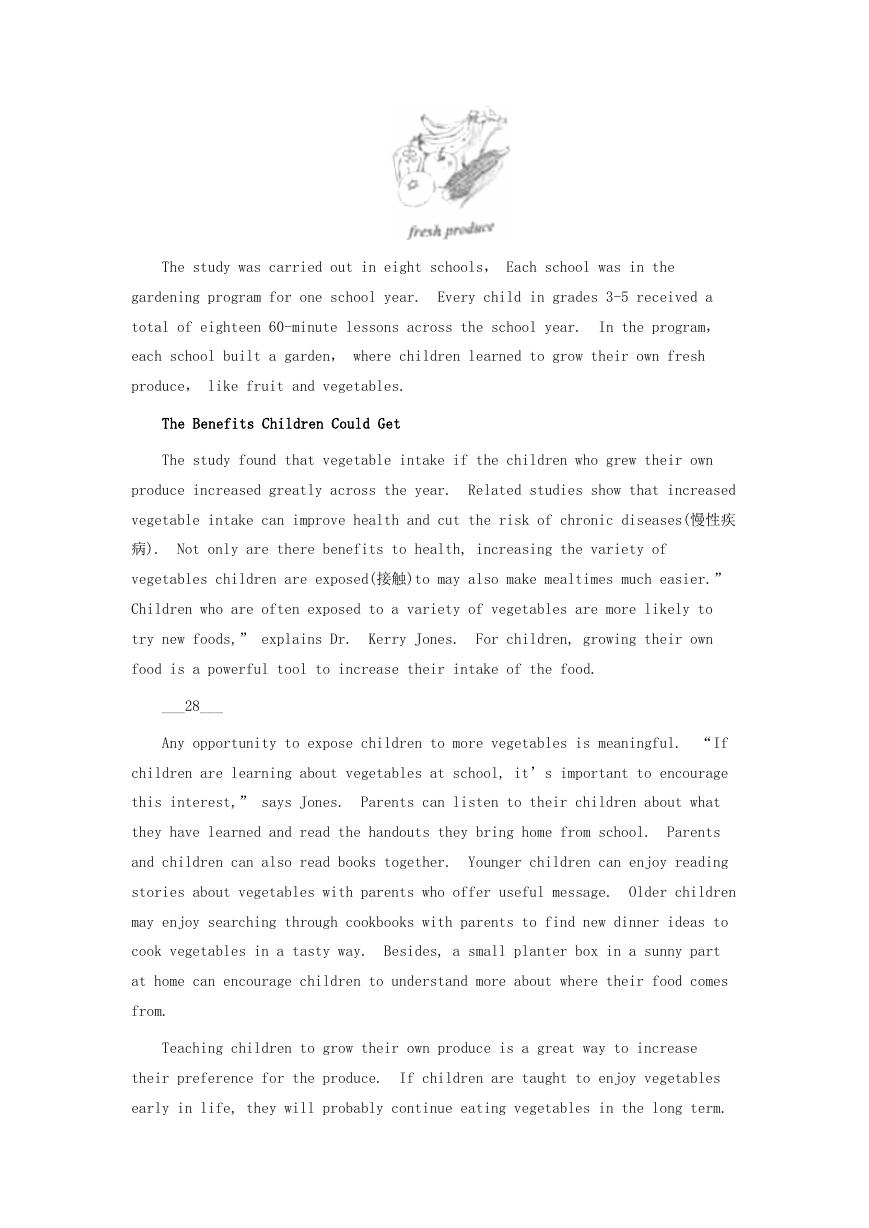









 2023年江西萍乡中考道德与法治真题及答案.doc
2023年江西萍乡中考道德与法治真题及答案.doc 2012年重庆南川中考生物真题及答案.doc
2012年重庆南川中考生物真题及答案.doc 2013年江西师范大学地理学综合及文艺理论基础考研真题.doc
2013年江西师范大学地理学综合及文艺理论基础考研真题.doc 2020年四川甘孜小升初语文真题及答案I卷.doc
2020年四川甘孜小升初语文真题及答案I卷.doc 2020年注册岩土工程师专业基础考试真题及答案.doc
2020年注册岩土工程师专业基础考试真题及答案.doc 2023-2024学年福建省厦门市九年级上学期数学月考试题及答案.doc
2023-2024学年福建省厦门市九年级上学期数学月考试题及答案.doc 2021-2022学年辽宁省沈阳市大东区九年级上学期语文期末试题及答案.doc
2021-2022学年辽宁省沈阳市大东区九年级上学期语文期末试题及答案.doc 2022-2023学年北京东城区初三第一学期物理期末试卷及答案.doc
2022-2023学年北京东城区初三第一学期物理期末试卷及答案.doc 2018上半年江西教师资格初中地理学科知识与教学能力真题及答案.doc
2018上半年江西教师资格初中地理学科知识与教学能力真题及答案.doc 2012年河北国家公务员申论考试真题及答案-省级.doc
2012年河北国家公务员申论考试真题及答案-省级.doc 2020-2021学年江苏省扬州市江都区邵樊片九年级上学期数学第一次质量检测试题及答案.doc
2020-2021学年江苏省扬州市江都区邵樊片九年级上学期数学第一次质量检测试题及答案.doc 2022下半年黑龙江教师资格证中学综合素质真题及答案.doc
2022下半年黑龙江教师资格证中学综合素质真题及答案.doc